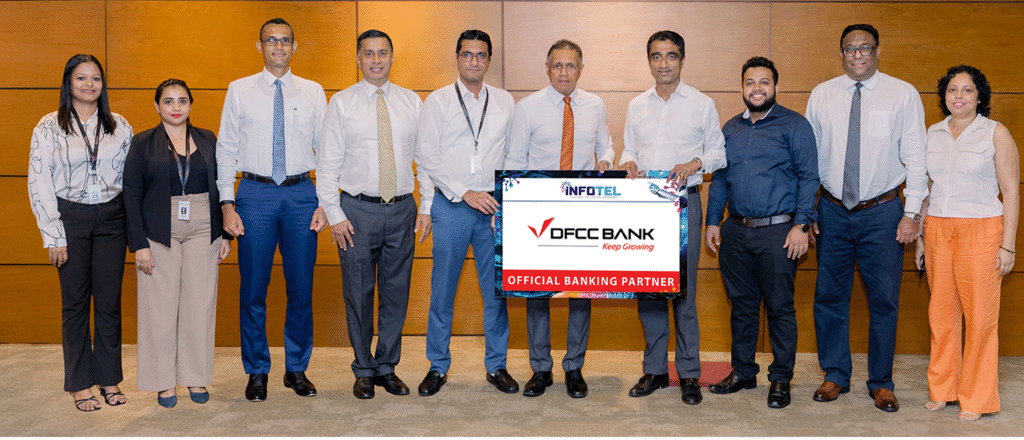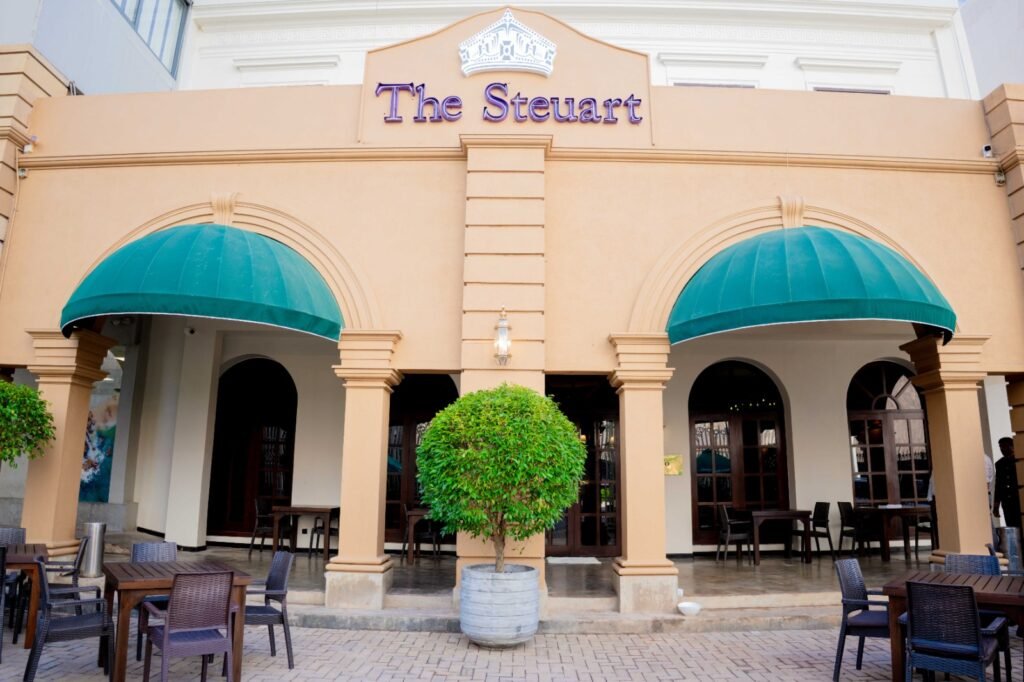Against the backdrop of collapsing global health protection and eroding humanitarian principles, the 3rd edition of Médecins Sans Frontières (MSF)/Doctors Without Borders South Asia’s Health and Humanity Summit convened in Kathmandu, Nepal under the theme “Beyond the Aid Crisis: Shared Responsibilities in a Fractured International (Humanitarian) Order” to tackle the growing crisis of responsibility in healthcare delivery. With over 180 participants, including public health experts, civil society actors, legal scholars, and humanitarian practitioners, the Summit sparked urgent conversations among people – about collective accountability, failing humanitarian mechanisms, and the contested politics of care in crisis settings.
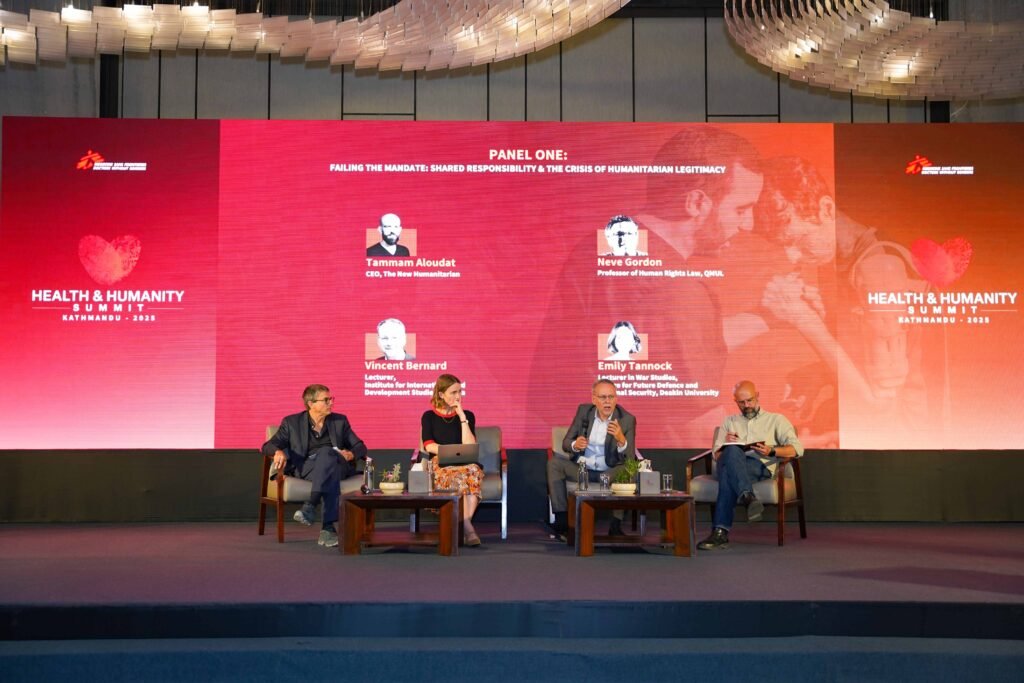
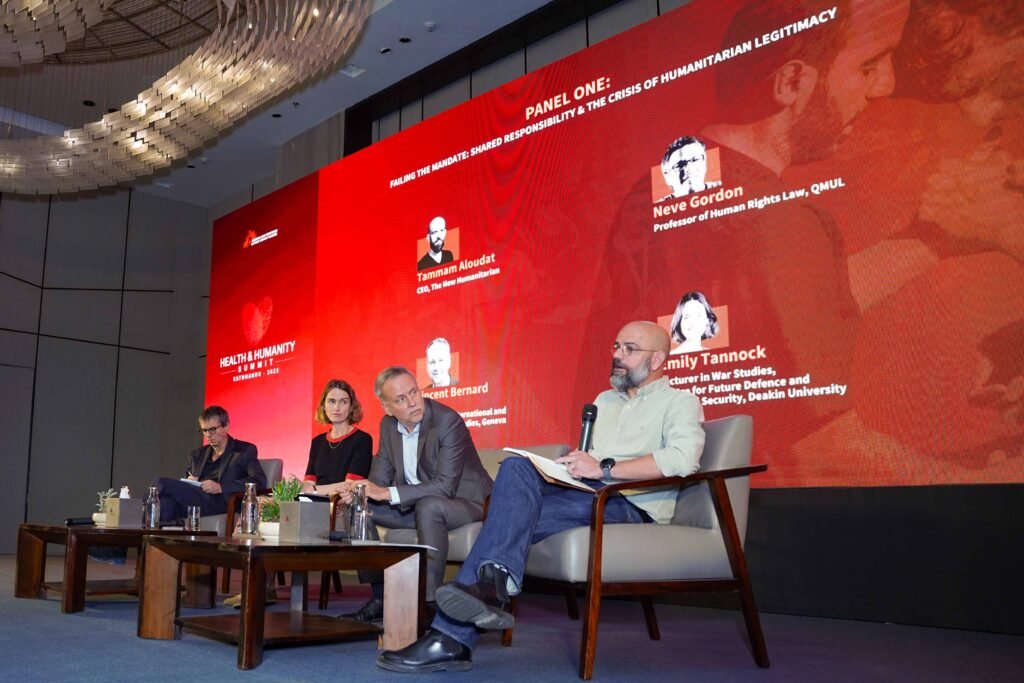
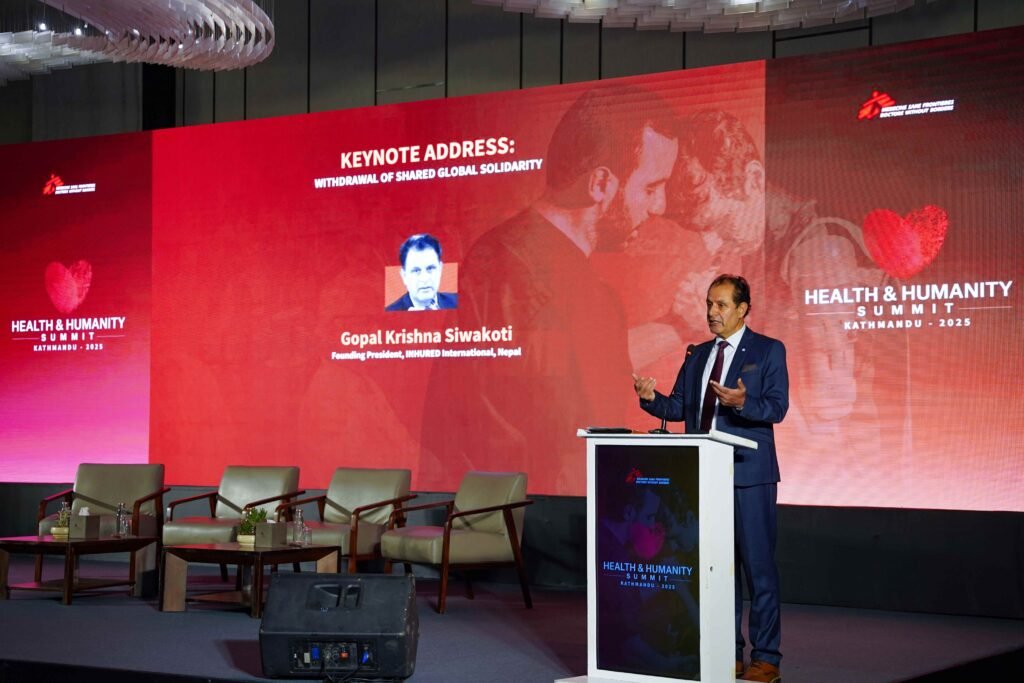
The 2025 edition of the Summit centered on three pressing themes: Shared Responsibility and the Crisis of Humanitarian Legitimacy, Governing Reproduction in Conflict and Crisis, and Local Resilience and South-to-South Solidarity. These discussions interrogated the erosion of neutrality, legal protections, and trust in humanitarian systems, and explored emerging models of care rooted in community leadership, feminist advocacy, and cross-border solidarity.
Speakers at the Summit included Dr. Unni Karunakara (Yale University), Neve Gordon (Queen Mary University of London), Sophie Désoulières (MSF-Operational Center Amsterdam), Roshmi Goswami (Feminist Human Rights Activist), Renata Reis (MSF Brazil), Aarathi Krishnan (RAKSHA Intelligence Futures), Shalmali Guttal (Focus on the Global South), and Pradeepa Jeeva (Global Fund for Women), among others.
Dr. Farhat Mantoo, Executive Director of MSF South Asia, opened the Summit with a powerful call to action: “We are witnessing not only the erosion of rule-based systems but also a retreat from the moral and legal duties entrusted to those in power. The silence and inaction of the international community, by both state and institutional actors, at the very moment people need them most is nothing short of appalling. Health is not a political option, it is a fundamental human right. MSF remains committed in delivering principled, patient-centered care, standing alongside communities forced to the margins. On the eve of World Humanitarian Day, this summit must become a space for genuine collaboration, shared courage, and leadership grounded in local realities. The future of humanitarian action rests with those who endure and respond to these crises every day. The summit aspires them to lead the conversations.”
Dr. Gopal Krishna Siwakoti, Founding President of INHURED International, Nepal, delivered the keynote address titled Withdrawal of Shared Global Solidarity. Reflecting on the erosion of common humanity through shuttered borders, neglect of climate justice, and the uncertain future of the “Grand Bargain,” he said: “Global instability fueled by conflict, inequality, and the rapid erosion of shared solidarity is crippling humanitarian action, especially in the world’s most vulnerable societies in which least developed countries are the hardest-hit. Shrinking civic space and disrupted aid flows are compounding risks for the marginalized section of the society thereby severely jeopardizing pro-poor safety nets.”
“Restoring trust in the humanitarian agenda calls for bold, equitable partnerships, empowered local leadership, and transparent governance. Confronting apparent donor fatigue and unlocking new avenues for resource mobilization requires urgent reinvestment in global solidarity anchored by a clear, actionable roadmap for collective impact. Only an inclusive community-driven rights-based approach can withstand the scale and complexity of today’s humanitarian crises”, he added.
The Summit’s Panel One, titled Failing the Mandate: Shared Responsibility and the Crisis of Humanitarian Legitimacy, examined the collapse of legal and moral frameworks protecting medical care, particularly in conflict zones like Gaza and Sudan. Moderated by Tammam Aloudat (The New Humanitarian), the panel featured Vincent Bernard (Geneva Graduate Institute), Emily Tannock (Deakin University), and Neve Gordon (QMUL), who collectively highlighted the failures of enforcement, governmental obstruction, and the diminishing legitimacy of international NGOs. Speakers called for reimagining trust, accountability, and coordination in the face of global paralysis.
Panel Two, Governing Reproduction: Health, Law, and the Politics of Denial in Crisis Settings, gave a sharp focus on sexual and reproductive health rights (SRHR) in crisis contexts. From the banning of female healthcare workers in Afghanistan to the silent rollback of HIV and abortion services in South Asia, the discussion exposed how women’s health is politically weaponized. Moderated by Prabina Bajracharya (Center for Reproductive Rights), panelists Seema Ghani (AFGA), Melissa Upreti (Human Rights Lawyer), Roshmi Goswami, and Sophie Désoulières (MSF-OCA) examined how both national policies and donor silence contribute to systemic neglect of reproductive autonomy.
In Panel Three, Local Resilience in a Fractured World: The Role of Communities, Civil Society, and South-to-South Solidarity, the Summit spotlighted the indispensable role of community-based organizations and grassroots actors in sustaining care where formal humanitarian systems fall short. Moderated by Leena Menghaney (Public Health Policy Expert), speakers including Shalmali Guttal, Pradeepa Jeeva, Dr. Unni Karunakara, and Renata Reis emphasized the transformative potential of equitable partnerships, community health workers, and horizontal networks across the Global South. The conversation called for a shift in power from international to local, challenging traditional top-down models of aid.
An experiential highlight of the Summit was the powerful exhibition accompanying the event. Featuring visual narratives on struggle and community action, the exhibition offered an immersive space for reflection. The day concluded with a participatory sand art performance that symbolized both the fragility and resilience of humanitarian ideals.
As MSF South Asia continues to convene leaders and practitioners from across the region, the Health and Humanity Summit serves as a critical platform for dialogue, advocacy, and collective visioning. In a time when health is increasingly politicized, and solidarity is under threat, the Summit reaffirms the urgent need to defend healthcare not just as a service—but as a right and responsibility shared by all.



